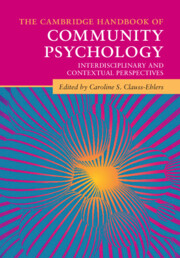Book contents
- The Cambridge Handbook of Community Psychology
- The Cambridge Handbook of Community Psychology
- Copyright page
- Dedication
- Contents
- Figures
- Tables
- Contributors
- Foreword
- Part I Foundational Concepts
- Part II Research, Assessment, and Program Evaluation
- Part III Community Psychology in Action
- 10 Women and Leadership
- 11 Community Resilience
- 12 Building Community Resilience and Supporting Disaster Risk Reduction through Social Action Efforts
- 13 The Consumer Recovery Movement in the United States
- 14 Taking Back the Streets
- 15 Promoting Adolescent Mental Health
- 16 Gowanus Canal and Public Policy
- 17 Family Support Services at Ronald McDonald House Promotes Healing of Seriously Ill Children
- 18 Community Psychology and a Fresh Look at Faith Healing Camps
- 19 Community Impact of Social Media
- 20 Supporting Communities through Educational Access
- 21 Psychological Impact of Climate Change on Communities
- 22 Optimal Local Government and Public Service Provision
- 23 A Public Health Approach to Delinquency and Incarceration
- 24 Public Service Organizations and Community Empowerment
- 25 Women and Immigration
- 26 Community-Based Transition Interventions for Adolescents and Young Adults with Neurodevelopmental Disabilities
- 27 Mental Health on College Campuses
- 28 LGBTQ+ Communities
- Part IV Where Do We Go from Here?
- Index
- References
26 - Community-Based Transition Interventions for Adolescents and Young Adults with Neurodevelopmental Disabilities
from Part III - Community Psychology in Action
Published online by Cambridge University Press: 16 December 2021
- The Cambridge Handbook of Community Psychology
- The Cambridge Handbook of Community Psychology
- Copyright page
- Dedication
- Contents
- Figures
- Tables
- Contributors
- Foreword
- Part I Foundational Concepts
- Part II Research, Assessment, and Program Evaluation
- Part III Community Psychology in Action
- 10 Women and Leadership
- 11 Community Resilience
- 12 Building Community Resilience and Supporting Disaster Risk Reduction through Social Action Efforts
- 13 The Consumer Recovery Movement in the United States
- 14 Taking Back the Streets
- 15 Promoting Adolescent Mental Health
- 16 Gowanus Canal and Public Policy
- 17 Family Support Services at Ronald McDonald House Promotes Healing of Seriously Ill Children
- 18 Community Psychology and a Fresh Look at Faith Healing Camps
- 19 Community Impact of Social Media
- 20 Supporting Communities through Educational Access
- 21 Psychological Impact of Climate Change on Communities
- 22 Optimal Local Government and Public Service Provision
- 23 A Public Health Approach to Delinquency and Incarceration
- 24 Public Service Organizations and Community Empowerment
- 25 Women and Immigration
- 26 Community-Based Transition Interventions for Adolescents and Young Adults with Neurodevelopmental Disabilities
- 27 Mental Health on College Campuses
- 28 LGBTQ+ Communities
- Part IV Where Do We Go from Here?
- Index
- References
Summary
This chapter discusses the state of current community-based interventions to support adolescents and young adults (AYAs) with neurodevelopmental disabilities (with a specific focus on spina bifida, autism spectrum disorder, and intellectual disability) as they navigate the transition to adulthood. Taking a social-ecological, developmentally grounded perspective, we provide an overview of the transition to adulthood and key elements related to this process for AYAs with disabilities. Examples of evidence-based community interventions and programs across different countries are discussed. Case studies elucidate how individual, familial, cultural, and community factors can facilitate or complicate the transition process. The implications of culture around disability are also highlighted. Lastly, future directions and ways that community psychologists can incorporate these interventions to support and empower AYAs with disabilities are provided.
Keywords
- Type
- Chapter
- Information
- The Cambridge Handbook of Community PsychologyInterdisciplinary and Contextual Perspectives, pp. 539 - 561Publisher: Cambridge University PressPrint publication year: 2021

